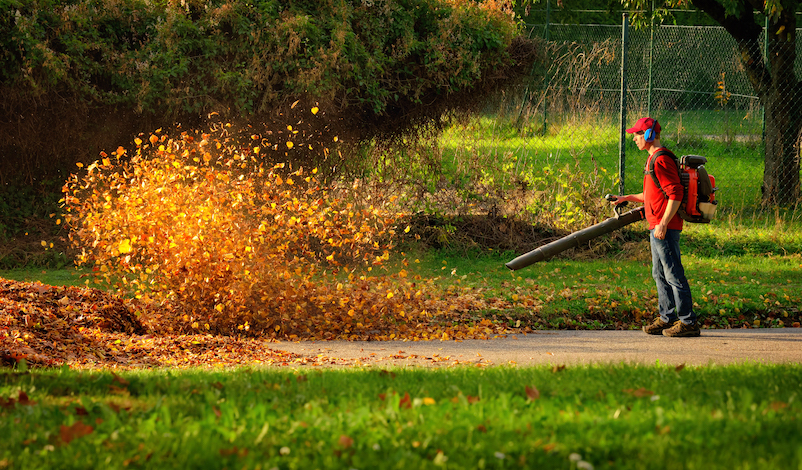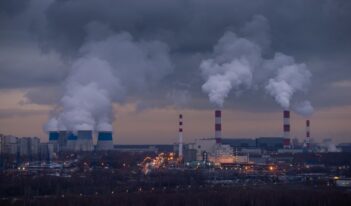
Restricting gas-powered leaf blowers can positively affect the health of people and the planet.
As nations gathered in Sharm el-Sheikh, Egypt, last fall for the latest United Nations climate conference, the language of complex international climate negotiations—“loss and damage,” “nationally determined contributions,” “global stocktake”—can seem far removed from the realities of our day-to-day life. For the growing chorus of people concerned about climate change but unsure of the next steps to avert climate disaster, listen to the noise emanating from the yard next door. We should work collectively to regulate, and ultimately ban, gas-powered leaf blowers in our neighborhoods.
Consider what happens every fall in my new hometown of Atlanta. It is a time of crisp days, stunning foliage, and cool nights. Sadly, Atlanta’s autumn beauty is too often disrupted by the ear-splitting sound of gas-powered leaf blowers. Every morning, landscaping companies deploy these gigantic beasts across the city, strapped to workers’ backs like dystopian World War II-era flamethrowers. The enemies are Atlanta’s leaves, and the leaf-blowers are determined to disrupt office Zoom calls, infants’ naps, and the peace and tranquility of your home.
What is so wrong with these gas-powered monstrosities? Let me count the ways.
First, their environmental and climate impacts are horrific. This technology relies on a combustible mix of oil and gas. A typical leaf blower reportedly burns just 60 percent of its fuel—the rest is spewed into the atmosphere. The two-stroke gas engines that power most leaf blowers use is an antiquated technology that has been phased out in nearly all areas—except yard work. But what is off-limits for driving and boating apparently remains just fine for residential neighborhoods.
In 2011, engineers at the car company Edmunds estimated that driving a Ford F-150 Raptor truck from Texas to Alaska would emit the same amount of air pollution as a mere half-hour of yard work with a two-stroke, gas-powered leaf blower. Indeed, Edmunds estimated that some gas leaf- blowers generate 23 times the carbon dioxide of the Raptor and 300 times more non-methane hydrocarbons. Both contribute to climate change and harm public health. Worse yet, gas-powered leaf blowers also emit nitrous oxide. The EPA estimates that the impact of one pound of nitrous oxide on warming the atmosphere is almost 300 times that of an equivalent pound of carbon dioxide. Professor Karen Jubanyik at Yale School of Medicine has astutely noted that lawn equipment may become one of the country’s largest sources of pollution.
Second, gas-powered leaf blowers are loud. Really loud. Some gas-powered leaf blowers generate a roar at 100 decibels, laying waste to topsoil, insects, and the environment while blasting air at 280 miles an hour. That 100-decibel roar is the same noise level as a passenger jet taking off. And it is not just the decibel level—the kind of noise is particularly pernicious. Leaf blowers operate at a low frequency, penetrating concrete walls and the inner sanctum of homes with ease. Some gas-powered leaf blowers can be heard nearly three football fields away.
Third, gas-powered lawn care has been linked to debilitating health issues, such as cancer, asthma, heart disease, and hearing loss. Workers are exposed to the air pollution and noise from leaf blowers at close range and over sustained periods of time. The Centers for Disease Control and Prevention found that one-quarter of Americans between ages 20 to 69 already suffer from diminished hearing. This outcome is due in large part to ambient urban noise, including sirens, traffic, and leaf blowers. Permanent hearing loss can occur with just 15 minutes of exposure at the highest decibel level that gas-powered leaf blowers operate. Author James Fallows has noted that “noise is the secondhand smoke of the era.”
The health impacts of leaf blowers also pose equity issues. Low-wage workers suffer the most. Tragically, they are almost assured to develop hearing issues if they are exposed to this mechanical madness on a daily basis.
Thankfully, some jurisdictions have started to take notice. To date, over 100 cities and towns across the country have banned or restricted the use of gas-powered leaf blowers. Washington, D.C., did so earlier this year. California will be phasing out gas-powered leaf blowers after it discovered that gas leaf blowers and related lawn care equipment emit more ozone pollution than all of California’s tens of millions of cars, combined.
But gas-powered leaf blowers are still legal in many states, including my newly adopted state of Georgia. Earlier last year, the Georgia state legislature even considered prohibiting any jurisdiction from banning gas-powered leaf blowers.
Landscape companies argue that electric leaf blowers are just not powerful enough compared to gas leaf blowers, and they say that the transition to electric will impose an increased cost. These arguments are—pardon the pun—overblown.
Although there may be a modest upfront cost to make the transition to electric, companies can manage these costs if bans are phased in over a few years or adopted with tax credits to help offset the transition—a successful strategy in some jurisdictions. And any cost—real or perceived—must be balanced against the noise pollution, environmental impacts, and health costs that continue from prolonged delay. Furthermore, battery equipment technology has advanced considerably and provides a much lower cost of ownership over time.
Gas-powered leaf blowers may seem like a seasonal, minor, “first-world problem” that is far removed from the weighty negotiations that took place in Egypt last fall. They are not. They are a serious public health problem that also pose significant harm to the atmosphere and environment.
The return of tranquility as the wind wooshes through the tree canopy is a worthy goal. But so is acting locally on global climate change while reducing harmful health impacts to workers and community residents alike. Let us start regulating gas-powered leaf blowers out of our neighborhoods.




